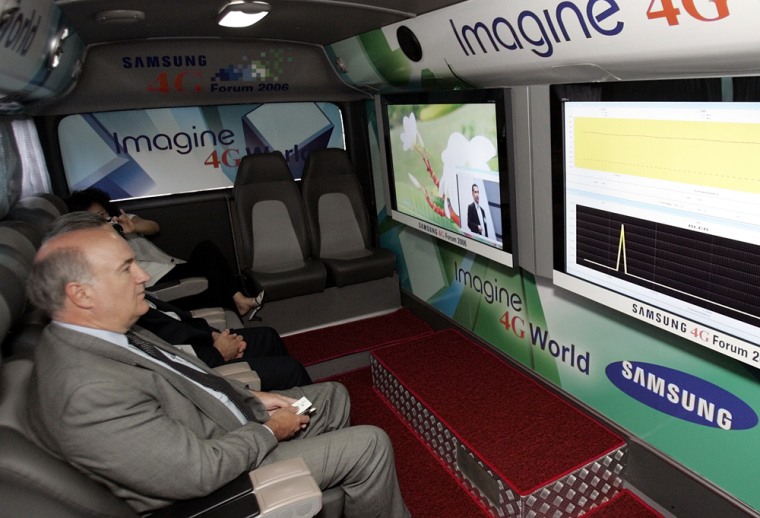Samsung Electronics Co. showed off its vision for the future of mobile technology Thursday, sending data wirelessly at blazing speeds to a moving minibus.
The connection was robust enough to support live images — including a high-definition movie — beamed from a conference the South Korean company is hosting here on fourth-generation, or 4G, wireless.
In a key step toward making the technology truly mobile, the device aboard the minibus switched seamlessly between two base stations — meaning the signal won't be lost when users are on-the-go.
The current prototype allows data transfers of 100 megabits per second, about 30 times typical broadband Internet speeds. It works even when the receiver is moving as fast as 75 mph.
But the promise is still far off: Currently, Samsung's data receiver is the size of a compact refrigerator. It won't be until 2008 that the device can be shrunk to fit in a mobile phone, said Lee Ki-tae, head of the company's telecommunications division.
And even then, frequencies need to be allocated and standards set, meaning the devices aren't expected to be in consumers' hands until after 2010.
The promises of yet another new wireless technology are familiar.
Mobile phone companies are still feeling the burn from their much-hyped third-generation technology. That cost billions in license fees and is now being implemented worldwide, but so far has yet to make much profit.
Now again, engineers boast of providing the world with even higher-speed wireless connections that make information accessible anywhere at anytime, enabling phone calls, quick movie and music downloads, and fast Web-surfing.
Wireless companies realize consumers need a truly compelling reason to embrace the gadgets that seek to blend different functions.
"Convergence has to bring real value to customers, otherwise customers won't buy it," said Alberto Ciarniello, a vice president at Italy's Telecom Italia.
Several conference participants mentioned the hunt for a "killer application" — a feature that people can't live without that draws users to a new technology.
But experts this time are arguing that simply getting online wirelessly at speeds far faster than now possible with most wired broadband connections will be enough to get people to open their wallets.
"The killer application is mobile Internet," said Siavash Alamouti, chief technology officer for the mobile wireless division of Intel Corp.
Meanwhile, another wireless technology called WiMax that is now emerging aims to set up wireless networks that may not be quite as fast as the promised fourth-generation, but still much speedier than today's average broadband connection.
South Korea has become the first country to offer limited WiMax service and plans to blanket the capital, Seoul, with the technology by early 2007, said Hong Won-pyo, an executive vice president at Korea Telecom.
U.S.-based Sprint Nextel Corp. has said it aims to launch WiMax networks in some American markets by late 2007, partnering with Samsung, Motorola Inc. and Intel.
Already, mobile phone companies are seeing the rapidly growing hunger of customers to do much more than just talk on their phones.
Cingular Wireless has 57.3 million subscribers in the United States, of which some 27 million — or nearly half — actively use data services, said Kristin Rinne, the company's chief technology officer.
"We are just at the beginning of a significant explosion," she said.
